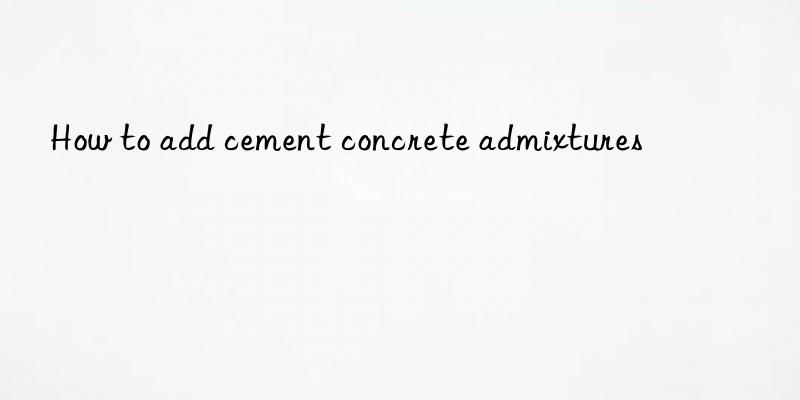
What is cement plus admixtures and what are their uses?
Cement plus admixtures, also called concrete admixtures, are chemicals that are added during the mixing process of concrete and account for less than 5% of the cement mass. They can significantly improve the performance of concrete. Substances are mixed into concrete with admixtures, which have the characteristics of low investment, quick results, and significant technical and economic benefits. With the continuous advancement of science and technology, admixtures have been increasingly used, and admixtures have become the fifth important component in addition to the four basic components of concrete.
Performance characteristics of cement plus additives
1. The strength and slump of concrete are basically the same. At the same time, the cement consumption can be reduced by 10-25%.
2. When the water-cement ratio remains unchanged, the initial slump of concrete can be increased by more than 10cm, and the water reduction rate can reach 15-25%.
3. It has a significant early strength and strengthening effect on concrete, and its strength increase range is 20-60%.
4. Improve the workability of concrete and comprehensively improve the physical and mechanical properties of concrete.
5. Good adaptability to various cements and good compatibility with other types of concrete admixtures.
6. Especially suitable for use in the following concrete projects: fluid concrete, plasticized concrete, steam-cured concrete, impermeable concrete, waterproof concrete, natural curing Precast concrete, steel bars and prestressed reinforced concrete, high-strength ultra-high-strength concrete.
Notes
1. When using porous aggregates, it is advisable to add water and stir first, then add and subtract Liquid.
2. When the slump is large, attention should be paid not to vibrating for too long to prevent bleeding and delamination.
Cement admixtures and cement additives are not the same thing. Cement additives must be distinguished from mortar and concrete admixtures
Cement additives are added during the cement production process. In order to improve cement production and cement performance, the total amount of additives added does not exceed 1% of the cement quality. If it exceeds 1%, it should be added in the packaging bag or The delivery note states that such additives should not promote corrosion of steel bars and should not degrade the properties of cement or mortars and concrete made from it. In the official standard EN197-1:2000, it is clearly stated that the total amount shall not exceed 10% of the cement weight (excluding pigments), and the organic additive amount shall not exceed 05% of the cement mass (dry basis). When cement is mixed with a series of concrete, mortar or mortar admixtures that comply with EN 934, the standard code of the admixture should be indicated on the packaging bag or delivery note.
Cement admixtures are added during the use of cement. There are more than ten commonly used concrete admixtures, and the dosage varies greatly. Air-entraining agent 0005 -0015%, water reducing agent 02-15%, accelerator 2-6%, expansion agent 6-15%. The Chinese meaning of "Tian" in cement additives is to add a small amount. In addition, cement additives and widely used mixing materials (added in cement production) and admixtures (added in cement use) should be distinguished.
Cement additives can be divided into two categories: powder and liquid according to their existence state. According to their performance, they can be divided into grinding-aiding type, strengthening type and compound type. of.
Measuring the quality depends on your usage needs. The grinding aid type depends on whether it can improve the fineness of cement under the same grinding state. The fineness and specific surface area, or whether the grinding mill time can be increased while the fineness and specific surface area remain roughly unchanged; the enhanced type depends on how much it can increase the compressive strength of cement under certain conditions.
Powder generally has a better strengthening effect; liquid generally has a better grinding effect.
The specific price depends on the transportation distance. The price of powder is about 800-1200/ton, and the price of liquid is about 8000-12000/ton.
I don’t know if the above is of any use to you.
</p



 微信扫一扫打赏
微信扫一扫打赏
